Monday Feb 23, 2026
Monday Feb 23, 2026
Thursday, 13 May 2021 00:30 - - {{hitsCtrl.values.hits}}
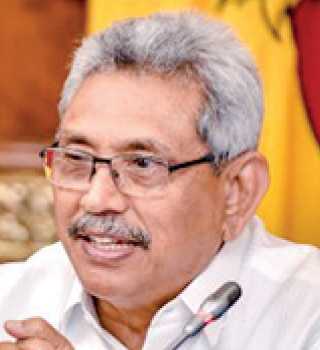
President Gotabaya Rajapaksa

State Minister Dilum Amunugama
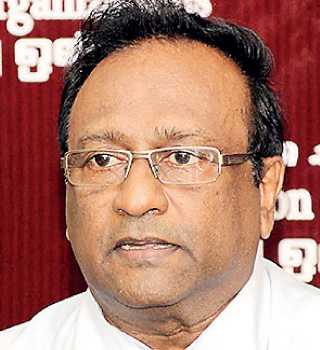
Minister Rear Admiral (Retd.) Sarath Weerasekara
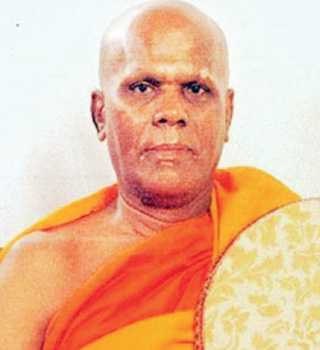
Ven. Wendaruwe Upali Thero
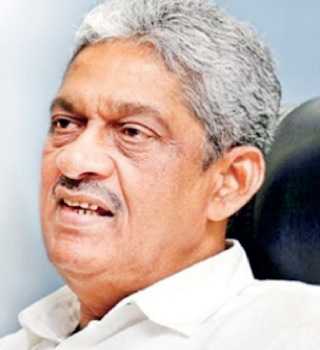
SJB Chairperson Field Marshal Sarath Fonseka
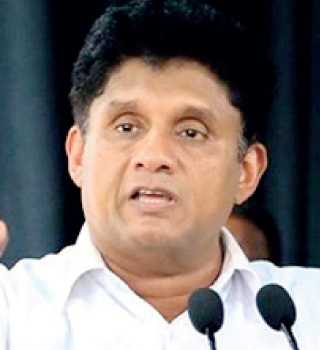
Opposition and SJB Leader Sajith Premadasa
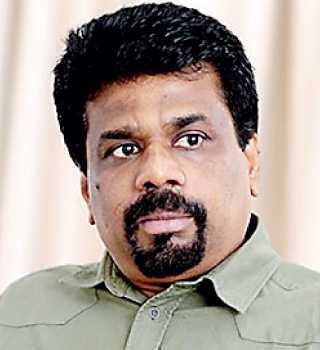
JVP Leader Anura Kumara Dissanayake
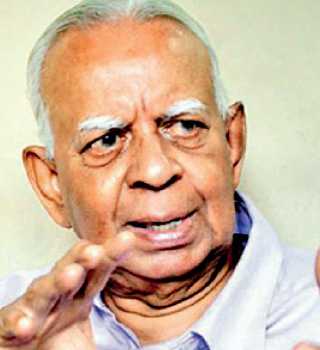
TNA Leader R. Sampanthan
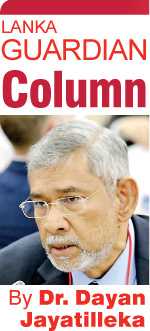 Though his resolute speech at Lakshman Kadirgamar’s funeral was the clincher, Mahinda Rajapaksa pretty much swung the 2005 presidential candidacy, because he, even more than President Kumaratunga, successfully managed the aftermath of the tsunami.
Though his resolute speech at Lakshman Kadirgamar’s funeral was the clincher, Mahinda Rajapaksa pretty much swung the 2005 presidential candidacy, because he, even more than President Kumaratunga, successfully managed the aftermath of the tsunami.
The management of the anti-COVID campaign has been decidedly less successful. Even though it has eroded his public support, President Gotabaya seems dogmatically determined to maintain a distorted, dysfunctional model of COVID control rather than reformatting it to one spearheaded by top medical professionals and the public administration (assisted by the military).
The COVID-related decision-making and management mechanism is a microcosmic model of the new state architecture, the military-driven and dominated institutional and social order that President Gotabaya is erecting.
This defence-dominated order, in which the martial profession is empowered over all other professions, cannot successfully cope with a complex public health emergency nor indeed a society as complex and ramified as ours.
New Zealand, Australia, Norway, S. Korea and Taiwan, which have open societies (which Sri Lanka’s is a distant approximation of) and have successfully combatted COVID should have been the government’s models, and the first four could easily have been reached out to for expertise and assistance.
The current crisis is rooted in the contradiction between social need and the public interest on the one hand and the President’s anomalous model on the other.
Good and evil
There are judgements of right and wrong, of good and evil, of morality and ethics which are universal. What then can you say of those who refuse to recognise these universal judgements? Such elements, such dispensations, have never been able to sustain themselves or to be sustained by outside powers.
We are reminded of the most instantly recognisable question of good and evil by an article in the Sri Lankan newspapers authored by Ambassador Yuri Materiy, the Ambassador of the Russian Federation to Sri Lanka, on the 76th anniversary of the defeat of Nazi Fascism (May 9).
He writes: “The victory in the war prevented the Nazis from spreading their inhuman ideology worldwide…
“…The efforts of all countries and peoples who fought against a common enemy resulted in victory. Russia is eternally grateful to the peoples of Great Britain, the United States of America, France, anti-fascists of various countries and members of the underground resistance…
“At the same time, it should be mentioned that it is the Soviet Union and the Red Army, who made the crucial contribution to the defeat of Nazism…” (Daily Mirror – http://www.dailymirror.lk/news-features/Role-of-the-Soviet-Union-in-a-great-victory/131-211541)
Ambassador Materiy emphasises the contemporary relevance of remembering the victory which stopped the worldwide spread of this “inhuman ideology”:
“It is our sacred duty to safeguard the truth about what happened during those years, and remember the grim lessons of war in order to prevent such tragedies from repeating themselves.” (ibid)
Fascism was defeated not merely because it erred by engaging in cross-border invasion, as some Sinhala ultranationalists think. The founding fascist, Mussolini, came to his end at the hands of his own countrymen and women, the Italian Communist partisans. Those who watched the Netflix show Money Heist would recall the song Bella Ciao, which ran through it. That was the marching song of the partisans of the anti-fascist Italian Resistance and remains popular to this day.
When it came to choosing between Japan, a rising Asian power, and the Allied powers which included Western imperialist and colonial oppressors, Mao Zedong, Ho Chi Minh, and the Communists in the Philippines, Malaya, Burma and Indonesia, all decided to fight the Japanese and cooperate temporarily with the Western democratic imperialists. They did so because rising Japan, with its domestic despotism, was the more aggressive power and in the Axis with Hitler and Mussolini.
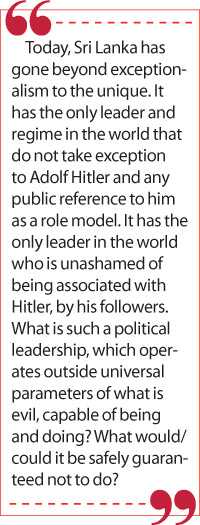 Fans of fascism
Fans of fascism
What happens when a person wielding power does not have or tosses aside a moral compass which guides them to recognise and reject evil? What happens to the citizenry at the hands of such a person? What happens when there is an organised network of such persons in positions of power?
What happens when a power-elite adheres to an ideology which not merely fails to observe universal distinctions of good and evil but flaunts the memories and symbolisms of evil and upholds historical leaders universally identified as personifying evil, as emblematic of positive values and as role models?
In June 2018, Ven. Wendaruwe Upali Thero wished presidential candidate-in-waiting Gotabaya Rajapaksa on his birthday, saying that he should be a Hitler. The candidate-in-waiting did not remonstrate, and actually defended the venerable monk.
As Meera Srinivasan of The Hindu reported at the time: ‘It came as a surprise birthday blessing to Sri Lanka’s former Defence Secretary, when an influential Buddhist monk recently said: “Let Gotabaya Rajapaksa prove his critics right by becoming a real Hitler…” As the opposition to the monk’s ‘Hitler remarks’ grew louder last week, Mr. Gotabaya said: “Even the Buddha said the Dhamma should be preached to people who have the capacity and the wisdom to understand it.” In his view, only those who did not understand the meaning of the comment made all the noise. It appears he took no offence.’ (The Hindu – https://www.thehindu.com/news/international/gotabaya-gets-an-unusual-compliment/article24300677.ece)
Several weeks ago, State Minister Dilum Amunugama revived the Hitler reference and reiterated it, signalling that if pushed, President Gotabaya Rajapaksa may choose to be a Hitler. The President didn’t fire him. Or tick him off publicly. Or distance himself from those remarks. Instead, Dilum Amunugama was conferred yet another State Ministry, that of Community Policing.
We are led by a person who does not see anything wrong, or if he does, chooses not to say anything in public, about Hitler as a positive symbol, and goes on to send a clear signal by rewarding, not punishing or ignoring, the politician who aired these views.
No individual in Government denounced or distanced themselves from the Hitler invocation; not even after Ven. Muruttetuwe Ananda Thero repeatedly denounced the Hitler reference. Why was there no attempt at damage limitation? Either because the Government did not think it was damaging, or because the Cabinet figured that Dilum’s views on the subject of Hitler were not at variance with those of the President and might have even been a bit of signalling by proxy.
 Political uniqueness
Political uniqueness
Ceylon/Sri Lanka was always exceptional but for good reasons. On the advice of Ivor Jennings, D.S. Senanayake successfully made the case for decolonisation on the basis that Ceylon, in its advanced political development was far more like the so-called white colonies (Canada, Australia, New Zealand) than the rest of the colonial world, and therefore deserved ‘Dominion status’. The exceptionalism continued: a fine educational system, social welfare, civilian democratic rule (during a trend to military coups) and an open economy which preceded Thatcher and Reagan. We even had a radio station (Radio Ceylon) which played the coolest music in Asia.
By 1989 the island had become “The Bloodiest Place on Earth with the possible exception of El Salvador,” according to The Economist (London). In 1999, one of the world’s most renowned experts on Fascism, Emeritus Prof Walter Laqueur had written in his book ‘The New Terrorism,’ that in its fanaticism and ruthlessness he could think of only one parallel for the LTTE and that was the fascist movement in Europe in the 1920s and 30s.
Today, Sri Lanka has gone beyond exceptionalism to the unique. It has the only leader and regime in the world that do not take exception to Adolf Hitler and any public reference to him as a role model. It has the only leader in the world who is unashamed of being associated with Hitler, by his followers.
What is such a political leadership, which operates outside universal parameters of what is evil, capable of being and doing? What would/could it be safely guaranteed not to do?
The absence of a moral compass or sense of shame manifested itself in Parliament in the angry exchange between the SJB’s Chairperson, Field Marshal Sarath Fonseka and Rear Admiral (Retd.) Sarath Weerasekara, the Minister of Public Security. In an exhibition of moral grotesquerie, Weerasekara ferociously denounced as unpatriotic, the criticism made by Fonseka of the presidential pardon granted to Sgt. Sunil Ratnayake, whose conviction and sentence for the crime of murdering several non-combatants, mostly children, had been upheld by the Supreme Court.
Weerasekara excoriated Fonseka for describing the slicing of the children’s throats by Ratnayake. Fonseka, the shrapnel-laden war veteran and suicide-bomb survivor who commanded the victorious war effort against the Tigers, was quoting from the text of the judgement. It was he as theatre commander, who had handed over staff Sgt Sunil Ratnayake to the Military Police in the year 2000 for the heinous crime that Weerasekara chose to whitewash on the grounds that the murderer was a frontline combatant. Weerasekara’s defence of the morally indefensible took place in Parliament on the day that President Gotabaya Rajapaksa was in the House.
Field Marshal Fonseka’s speech erected a firewall between military heroism and atrocities against unarmed civilians. Admiral Weerasekara removed that moral-ethical firewall by stridently defending the pardon of a child-killer and pronouncing him a war hero.
Weerasekara opens the door to the question, if the atrocity of cutting children’s throats can be justified in Parliament by the Minister of Public Security, and the murderer exculpated and exalted as a war hero, what might have been permitted and practiced during the war? Thus, his shocking discourse helps the outrageous Ontario-based ‘genocide’ campaign. The question also arises as to what kind of ‘public security’ will prevail in Sri Lanka.
Serious consequences
If a leader raises no objection to pro-Hitler references, there is no moral floor below which he/she and his/her co-thinkers cannot fall.
That has consequences. ‘The Politics of Moral Capital’ was the title of a book by the finest political theorist of my personal acquaintance, Prof. John Kane, which demonstrated that the moral factor was the key resource and crucial variable in successful political leadership.
My own research, published as two books, a postmortem on the collapse of global Socialism and an inquiry into the successful politico-military leadership of Fidel Castro, concluded that if you strive for, win and hold the moral high ground, you eventually win the political or political-military war even if you lose military battles. The converse is also true, as Prabhakaran proved.
Joseph Nye’s ‘soft power’ explained that more crucial than ‘hard power’ (military might) is the universal appeal of one’s story and culture. Meanwhile Anatol Lieven and John Hulsman made the case for ‘Ethical Realism’: Realism is imperative but to be sustainably successful, must also be recognisably ethical.
A government’s ethics deficit may be compensated for in the short-term, if the populace is enjoying rising prosperity. An illustration is J.R. Jayewardene’s first term. The Gotabaya government does not have that compensatory factor. It won’t be achieved by the Port City, which at best may ensure some ‘trickle through’ from the enclave. The dualism of an Open Economy in the Port City enclave and a closed economy in the country, cannot work.
The evening news shows peasants complaining that there is a shortage of fertiliser and the weeds will devour most of the field if fertiliser isn’t made available. Many said that continued supply of fertiliser should have been ensured before making any drastic decisions. President GR has just appointed a 46-member task force headed by Basil Rajapaksa to plan the transition, which logically he should have done before the ban.
The decisions to de-regulate the forest reserves, permit corporate farming and fencing off of sources of water and grazing land, and now the ban on chemical fertiliser imports, cannot be attributed to COVID-19. The ban on imports has reduced availability and driven up the price of coconut oil, a staple of Lankan cookery. Industrial chemicals and agro-chemicals now require import licenses. These are man-made, presidentially-proclaimed policies.
President Jayewardene accelerated the Mahaweli scheme because he grasped the importance of a prosperous rural peasantry; a rural middle (or ‘kulak’) class. No previous Sri Lankan leader has been more impervious to the anguish of the peasantry than President Gotabaya. Coming from a candidate whose family had an abiding base of peasant support and whose father co-founded the party which cut into the UNP’s peasant base built by D.S. Senanayake, this is indeed an irony.
Thus, the ethical deficit is compounded by not merely a lack of prosperity but an avoidable fall in productivity and prosperity in town and countryside. A process of underdevelopment and povertisation is underway.
Politics of democratic resistance
The Opposition’s strategic blind-spot is the incomplete recognition of the character of the regime, its trajectory and project.
Surely the fact that the President continues to maintain the increasingly dysfunctional model of a military-led and military-centric rather than a medically-led anti-COVID campaign, indicates that military control is meant to be embedded, displacing and supplanting civilian control?
When the degree of State and social militarisation we currently observe is what usually happens only after the seizure of power by a military and the installation of a junta, isn’t the regime’s strategic game-plan discernible?
If the SJB and JVP believe what they say about the Easter massacre and the Deep State, shouldn’t they ask themselves whether the latter entity will peacefully relinquish power after an election that its preferred candidate/party loses?
If the SJB, JVP and FSP believe what they say about the Port City, mustn’t they ask themselves whether the world’s biggest currency laundromat will risk its functioning by permitting the peaceful electoral transfer of power (which is not within the ‘governance experience’ of the patron)?
If the Opposition believes what it says about influential private military contractors, shouldn’t it ask itself whether the local Blackwater, plus the local Fox News, plus the local Canary Islands-type offshore bankers, wouldn’t intervene to prevent peaceful electoral change?
Shouldn’t the Opposition consider that the import bans are driven by the surreal logic of preemptive immunity to Western pressures/sanctions in the case of a Myanmar move, by turning Sri Lanka into a self-sealed North Korea? Isn’t the regime’s model, Hong Kong in the Port City and North Korea in the country?
With a Minister for Public Security praising a convicted child-killer as a war hero and a State Minister for Community Policing thinking that Hitler is a cool name to drop, shouldn’t it strike the Opposition that a regime with such an ethos will have no qualms in using any method to remain in power?
Lasantha Wickrematunge may have been Sri Lanka’s first Jamal Khashoggi, but will he be the last?
The regime’s project goes against the grain of 90 years of civilian democracy and almost 45 years of the Open Economy in Sri Lanka. Therefore, it will fail, but not without trying to permanently perpetuate the emergent power-elite.
The SJB, JVP and TNA hope for an electoral-democratic endgame. The space for that outcome will first have to be cleared and secured through the politics of peaceful democratic resistance. That would take the Opposition morphing into Movement mode.